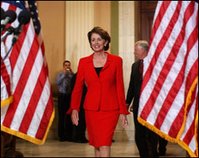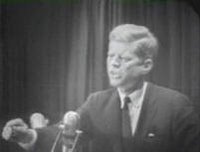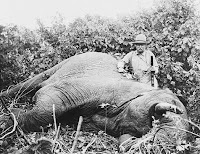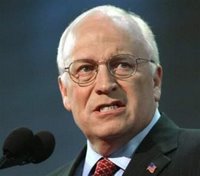 The one, holy, catholic, and apostolic state
The one, holy, catholic, and apostolic stateAl Smith lost in a landslide. The 1928 Democratic presidential nominee may have been governor of New York, but he was also a Catholic. Smith garnered only 41% of the popular vote and a minuscule 16.5% of the electoral vote (most of that, ironically, from the deeply Protestant states of the Deep South, still solid for the Democrats in those days). To many people, the choice of a Roman Catholic presidential candidate made the Democratic Party the party of “rum, Romanism, and rebellion” all over again. Governor Smith's more paranoid opponents charged that he would, if elected, open a tunnel from the basement of the White House all the way to the Vatican, so that the pope could more conveniently run the affairs of the United States.
The lesson was not lost on John F. Kennedy. An ambitious young politician as well as a Roman Catholic, Senator Kennedy knew that many Protestants still regarded his church as the antithesis of church/state separation. During the many centuries when the only form of Christianity in western Europe was Roman Catholicism, popes were not shy about exercising temporal as well as religious authority. The Church fancied itself as the God-ordained superior to all civil governments and in many cases could make that stick by threatening excommunication or interdicts denying the sacraments to the subjects of rebellious princes.
That all changed when Christianity splintered into innumerable rival sects after Luther's rebellion against the authority of Rome, but Catholicism survived as the largest single sect and the single most influential religion in many nations. Its displeasure could result in the defeat of politicians and the frustration of social legislation. In the predominantly Protestant United States, Catholic politicians had to tread lightly, as Senator Kennedy proceeded to do, briskly but cautiously, in his encounter with the
Greater Houston Ministerial Association. Kennedy explained that he and the Protestant ministers shared many of the same concerns and sought the same goals for the nation:
 But because I am a Catholic and no Catholic has ever been elected President, the real issues in this campaign have been obscured—perhaps deliberately, in some quarters less responsible than this. So it is apparently necessary for me to state once again—not what kind of church I believe in for that should be important only to me, but what kind of America I believe in.
But because I am a Catholic and no Catholic has ever been elected President, the real issues in this campaign have been obscured—perhaps deliberately, in some quarters less responsible than this. So it is apparently necessary for me to state once again—not what kind of church I believe in for that should be important only to me, but what kind of America I believe in.
I believe in an America where the separation of church and state is absolute—where no Catholic prelate would tell the President (should he be a Catholic) how to act and no Protestant minister would tell his parishioners for whom to vote—where no church or church school is granted any public funds or political preference—and where no man is denied public office merely because his religion differs from the President who might appoint him or the people who might elect him.
Kennedy's speech occurred in September 1960 and was designed to defuse the religion question in the election that was less than two months away. It was certainly one of the keys to his narrow victory over Richard Nixon. (In such a close race, all factors can be regarded as crucial. Today most people remember the televised debates, since a candidate's personal religion has faded as an issue of contention.)
A change of contextKennedy's presidency seemed to make moot the issue of Roman Catholicism. Senator Muskie's religion was not cited as a problem in his 1972 campaign. Kennedy's brother-in-law, Sargent Shriver, ran for president in 1976, but it was a weak campaign rather than his Catholicism that caused Shriver to fall short.
But the issue has been coming back to life. In the 1968 encyclical
Humanae Vitae, Pope Paul VI condemned all forms of chemical or prophylactic contraception (only “
natural” avoidance of pregnancy by means of periods of abstinence was allowed). In the 1973
Roe v. Wade decision, the U.S. Supreme Court struck down the nation's abortion laws. As contraception and abortion became the focus of great political controversy, the Catholic Church found itself disappointed in its adherents. Many Catholics styled themselves “pro-choice” rather than “pro-life,” and the hierarchy insisted that such Catholics were embracing false doctrine. The authority of the Church is increasingly exerted toward influencing the political behavior of Catholics in the U.S., although that path is fraught with danger. It awakens Protestant and secular fears.
The Roman Catholic Church is on a mission in the United States to outlaw abortion (and, if it had its way, contraception, too). Still, it moves slowly, partly out of caution and partly because it is a big and somewhat clumsy institution. The pope husbands his resources and it is often the lesser prelates who first take the initiative. We've seen this recently with the lectures of
Cardinal Schönborn, who wants the Church to step back from John Paul II's pronouncement that evolution is “more than a theory.” (Schönborn is a friend of intelligent design creationism.)
Although he never ran for president, New York governor Mario Cuomo was for several years regarded as one of the strongest possible candidates for the Democratic nomination. Like his predecessor Al Smith, Cuomo espoused the Catholic faith. With the attention being paid to Church teachings on life issues in general, and abortion in particular, Cuomo took the opportunity at a Notre Dame University
forum in 1984 to address the role and responsibilities of the Catholic politician:
 [T]he Catholic who holds political office in a pluralistic democracy, a Catholic who is elected to serve Jews and Muslims and atheists and Protestants, as well as Catholics, bears special responsibility. He or she undertakes to help create conditions under which all can live with a maximum of dignity and with a reasonable degree of freedom; where everyone who chooses may hold beliefs different from specifically Catholic ones, sometimes even contradictory to them; where the laws protect people's right to divorce, their right to use birth control devices, and even to choose abortion....
[T]he Catholic who holds political office in a pluralistic democracy, a Catholic who is elected to serve Jews and Muslims and atheists and Protestants, as well as Catholics, bears special responsibility. He or she undertakes to help create conditions under which all can live with a maximum of dignity and with a reasonable degree of freedom; where everyone who chooses may hold beliefs different from specifically Catholic ones, sometimes even contradictory to them; where the laws protect people's right to divorce, their right to use birth control devices, and even to choose abortion....
We cannot justify our aspiration to goodness as Catholics simply on the basis of the vigor of our demand for an elusive and questionable civil law declaring what we already know, that abortion is wrong. Approval or rejection of legal restrictions on abortion should not be the exclusive litmus test of Catholic loyalty. We should understand that whether abortion is outlawed or not, our work has barely begun: the work of creating a society where the right to life doesn't end at the moment of birth, where an infant isn't helped into a world that doesn't care if it's fed properly and housed decently and educated adequately, where the blind or retarded child isn't condemned to exist rather than empowered to live.
Although Cuomo's talk was widely criticized by conservative Catholics for defending the independence from Church dogma of his political judgment, many Catholics felt he had the weight of reason on his side. It was, after all, a clear echo of the position that John F. Kennedy had taken. But Governor Cuomo's absence from the presidential primaries and general election tempered the controversy; it simmered and did not come to a boil. The next round would play out on a regional stage rather than in a national arena.
A test case?
In the pro-life cause, one of the first overtly political actions was taken in 1989 in San Diego, where Bishop Leo Maher announced that he would refuse to give communion to
Lucy Killea, a pro-choice Democratic assembly member who was running in a special election for state senate. Killea was a Catholic and Bishop Maher announced that her position on abortion rights was “in complete contradiction to the moral teaching of the Catholic Church.” The bishop's action was counterproductive. Killea won a clear victory in a race that had been expected to be very close. Some commentators suggested that the bishop's intervention had secured the election for Killea, who went on to serve a couple of terms in the California state senate.
Perhaps the Killea episode taught the Church that it had overreached, but in 2004 ecclesial authority was exercised as never before in opposing the candidacy of a Roman Catholic for president. Cardinal Ratzinger—better known today as Pope Benedict XVI—issued a private letter to Catholic bishops in the United States on denying the eucharist to politicians who did not adhere sufficiently closely to the Vatican line. Titled
Worthiness to receive Holy Communion—General principles, the document clearly prompts American clerics to refuse the sacrament to candidates like Senator John Kerry:
Regarding the grave sin of abortion or euthanasia, when a person’s formal cooperation becomes manifest (understood, in the case of a Catholic politician, as his consistently campaigning and voting for permissive abortion and euthanasia laws), his Pastor should meet with him, instructing him about the Church’s teaching, informing him that he is not to present himself for Holy Communion until he brings to an end the objective situation of sin, and warning him that he will otherwise be denied the Eucharist....
A Catholic would be guilty of formal cooperation in evil, and so unworthy to present himself for Holy Communion, if he were to deliberately vote for a candidate precisely because of the candidate’s permissive stand on abortion and/or euthanasia.
There was no mistaking its intent. This time the intervention worked. Although Vice President Al Gore (a Baptist) had carried the Catholic vote in 2000, American Catholics in 2004 turned their backs on their co-religionist and voted instead for Bush. The Vatican chalked up a win.
Pelosi in the hot seatThe stakes are continuing to rise. As Speaker of the House, Nancy Pelosi is now the highest ranking Catholic in the federal government. She is also resolutely pro-choice, supports same-sex unions, and otherwise departs from strict adherence to the Church's political platform on social issues. The nuanced approaches of John Kennedy and Mario Cuomo are all but forgotten. Pelosi will have no honeymoon with the Vatican or its American representatives. They are stalking her. Indeed, they have already broken cover:
Pelosi's Catholicism
Editor—Regarding “Pelosi's new image as Italian Catholic mom—more than a ‘San Francisco liberal’” (Matier & Ross, Jan. 7): What a joke! If Nancy wants to reclaim her Catholicity, she had best start by reviewing Catholic teaching. She said that she considered herself a conservative Catholic, but nothing is further from the truth.
She supports too many positions the church is against, beginning with pro-life issues: embryonic stem-cell research, gay adoptions, partial-birth abortion, funding contraception and U.N. family planning, same-sex marriage. She favors allowing minors to have an abortion without their parents' knowledge. She is against making it a crime to harm a fetus while committing other crimes. She is against allowing funding for health providers who do not provide abortion—which would close Catholic hospitals.
She is not a Catholic in good standing with her church.
Rev. John Malloy
SS Peter & Paul Church
San Francisco
Pelosi's defenders were quick to swing into action, including some of her co-religionists. Here's one from the January 10, 2007, edition of the
San Francisco Chronicle:
Casting stones at Pelosi's Catholicism
Editor—I find Rev. John Malloy's attack on House Speaker Nancy Pelosi's faith (Letters, “Pelosi's Catholicism,” Jan. 9), describing her as “not a Catholic in good standing in her church” because she refuses to legislate Catholic doctrine into U.S. law, untoward and a little bit frightening.
While a religion can preach anything it likes, and its adherents are free to follow it to the last tenet, politicians who foist that faith on the rest of us have no business being in the government—and it's hoped the November election proved that.
It boggles the mind that the good reverend doesn't seem to understand that people may follow a faith, believe in its values for themselves, but understand that our pluralistic government should never legislate that faith or any other into our body of law.
That's the kind of person of faith I admire. Someone such as Pelosi, a Catholic grandmother, literally. I'm appalled that our local church is so blatantly political, and suggest that it has more in common with the fundamentalist fanatics that are destabilizing the world than the tolerance, understanding and forbearance for which San Francisco is famous.
It also shows a shocking disregard for our inviolate separation of church and state. Kudos to the speaker for a pitch-perfect swearing-in. She does our great city proud!
Eric Diamond, San Francisco
Thrust and riposte. The duel has been going on a long time and the end is obviously not in sight. Will San Francisco's bishop decide he has to make an example of Speaker Pelosi by formally reading her out of the Church? If he does, what will occur? Will Pelosi's political career be crippled or will she be strengthened?
Killea or Kerry? Which example tells us the future?
 Maybe you had to be there
Maybe you had to be there













































